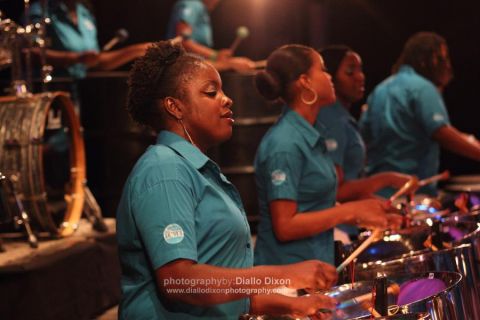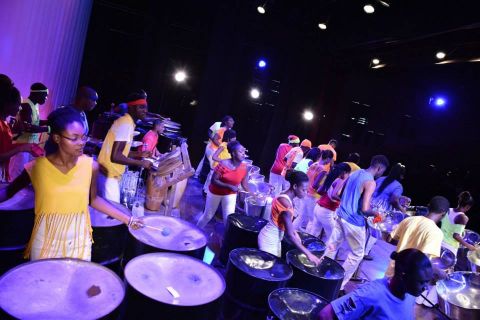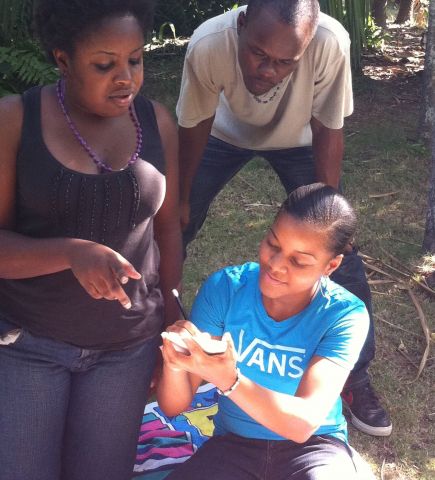Blog
Jamaica's Panoridim competes in International Panorama

In August, steelbands from all over the world will converge in Trinidad for the first ever International Panorama Competition. Steelbands will compete against twelve of Trinidad & Tobago's best bands to walk away with the title of International Panorama CHAMPION. The competition is organized by PanTrinbago, the governing body for steelpan based in Trinidad.
After having originated in Trinidad as a major highlight of their carnival season, the model of the Panorama competition has spread far and wide. Similar competitions are held in many Caribbean islands including St. Vincent & Grenadines and Barbados, and in parts of the USA, most notably in Brooklyn, New York. Jamaica, despite having many steelbands associated with churches and schools, has not yet adopted any form of steelpan competition.
However Jamaica's UWI Panoridim Steel Orchestra, with panyard on the UWI Mona campus, is recognized by PanTrinbago and has competed twice in the World Steelband Festivals hosted in Trinidad, receiving a third place trophy for their Quartet entry in 2000. Panoridim is the longest-running and largest steelband in Jamaica, and is the only band most similar in size, style and function to the medium bands in Trinidad & Tobago. With support from the University of the West Indies and Panoridim's corporate sponsor ICWI Limited, the band will be representing Jamaica at the international Panorama Competition on August 9.
PAN DOES IT by TalkUpYout

Talk Up Radio Senior Reporter and Producer Kristeena Monteith reported on Panfest 2015: Pan Does...
"I was not a fan of steel pan. Sure, it sounded great in songs like Nicki Minaj’s “Pound the Alarm”, and, as a Caribbean person I appreciated it’s place in history. Pythagoras, a Greek mathematician (aka the triangle guy from 3rd form maths) calculated a very fancy, very complex musical cycle of “fourths and fifths” and apparently, the steel pan is the only musical instrument to follow this configuration exactly. It is one of the few musical instruments developed in the 20th century but I wasn’t, by any stretch of the imagination, a steel pan fan. Also, despite the fact that Panoridim, the steel pan band whose show I was going to see was the first steel band founded in Jamaica, having been formed in the 70’s, I was not familiar with this band.
Pan Does 2015 changed all of that. Firstly, the orchestra, Panoridim and the team at the Philip Sherlock Centre for the Creative Arts deserve a round of applause for breaking the cycle of events running on “Jamaican time”. Pan Does began promptly at 4 pm as scheduled.
And what a show it was. The pieces were exquisitely arranged, performed with deft precision and infused with the youthful exuberance of the orchestra members. Their energy was infectious. Every single person in the audience was dancing in his or her seat by the second item. The lineup flowed quite fluidly from the biggest pop tunes of last year to the reggae tunes we all know and love. And then, from beautiful classical music pieces including one composed by a member of the band to the home of steel pan, exciting soca. Trust me, everything sounds good in steel pan but wait for that soca section because steel pan was made for soca and the band paid homage to the Trinidadian roots of steel pan and soca. Even if you’re not a soca junkie when that steel pan hits you, you will feel the vibe to palance.
I really can’t get over the orchestra members. They were brilliant and made the music come alive. I could tell that they were enjoying themselves and that they put much time and effort into their orchestra. They had costume changes, props and a number of surprise moments which found them moving on stage much to the delight of the audience.
I loved every single item on the lineup but steel pan Moonlight Sonata was my favourite. Played under soft blue light, it was breathtakingly beautiful. The medium of steel pan added texture and colour to it and made it sound as if it was my Caribbean lullaby instead of belonging to some Bavarian princess or a Tzarina in a Slavic monarchy. Beethoven would be proud.
“Kotch” was another crowd pleaser. It was performed with spectacular light play. Flashing from no lights to harsh red lights in some places and creating the perfect silhouette of the band it was visually and auditorily pleasing.There was something for everyone. Fans of alternative music, dancehall, modern reggae versus traditional reggae, what have you would all find something to love. It was all there, and all perfect.
I spoke briefly with a few members of the audience before and after the show and they were all pleased with the quality of the music. Some had known nothing about steel pan and came to see what the fuss was all about and some people had been following both steel pan and Panoridim for decades and were loyal supporters but all could agree that the show was amazing. One lady I spoke to, whose daughter Susan is a member of the orchestra, was especially fond of the band converting contemporary music into steel pan and thought it was an effective way to reach young people who have not been exposed to live music. I wholeheartedly agree.
We are the children of the digital age. Our music occupies virtually no space on our mobile phones and it comes to us through little speakers jammed into our ears but trust me, you have never really heard music until you’ve heard any form of life music. To be in the presence of musical instruments and musicians and to see, feel, and hear music being born is something too extraordinary to be summed up in words. Panoridim’s take on steel pan has made a fan of me so go to UWI and watch either their 4 or 7 pm show this Sunday April 24th and let them do the same for you. But if you can’t, remember the Caribbean has been truly blessed with music. Just stand on a beach or on a mountain and listen to the sand, the sea and the wind orchestra."
Article: The Family Behind the Music

By Shantel Thomas
Known for its wide repertoire, the UWI Panoridim Steel Orchestra has never fallen short of its ten commandments of pan. From symphonies to mambos played by their magnificent seven sections, the orchestra continues to expand its reputation of being enthusiastic, energetic and entertaining. Though capable of making six songs or more collide during a performance, love for the music and what we do as a band often blocks any desire to take five. Our passion is fuelled by supporters chanting requests such as “Four Lara!”, through crowds as thick as those in Halfway Tree. Yet at the end of it all, it comes down to just the two of us: the player and the instrument.
What serves to separate and differentiate the UWI Panoridim Steel Orchestra (referred to as Panoridim) from other orchestras is the family behind the music. We all are one.
The steel pan, a percussion instrument, was invented on the twin island country of Trinidad and Tobago in the 1930’s. It had been developed by youths who, having been denied the opportunity to play their ancestral drums turned to empty oil drums to satisfy a musical yearning (Walrond, 2007). Ironically, an instrument forged out of resistance and rebellion is the same instrument played by both active and prospective members, out of total submission and compliance to our musical authorities.
The process of becoming a member of Panoridim is somewhat rigorous, thus ensuring that the best quality is maintained. Before becoming a member, one is required to do a ‘rhythm audition’. Once successful, the prospective members are classified as members of the band even though the unwritten culture of the orchestra states otherwise. Consider a young child being adopted into a family, in the same way, much evaluation, constructive criticisms and scrutiny is necessary to guarantee that each party is compatible for building a life-long relationship.
Initially we were branded with the title “NEW members”, a verbal reminder of our stance as it relates to the orchestra’s hierarchical structure. Growth towards being fully accepted and integrated into the family became evident with every performance, every hour of every rehearsal, and every strike our now much loved sticks made as music was created. Music is defined as “the art of arranging tones in an orderly sequence, so to produce a unified and continuous composition" (Webster II, 1984). Eventually, the bonds were strengthened between who were once viewed as new members and the existing members, as the flow of communication and interaction got easier. From here, the musical journey officially began for the academic year, paving the way as an excuse to act and function ‘crazy’, one of the typical characteristics of a Panoridim member.
Founded in 1977, the driving force of Panoridim has always been its members, proof of a phrase well known by all, “the band that lymes together stays together”. A lyme (as known by the orchestra) refers to the gathering of band members for the purpose of socializing, conversations, or recreation. This is an integral aspect of being in the band as it builds rapport and teaches us to be our brother’s keepers. It makes us more than just a band, rather a family. It is not flesh and blood, but the pans that makes us family.
To learn a song takes time and dedication, especially if the song was Dus in di Face, Pan in A-Minor, Band from Space or Steel Pan Alley. The majority of our time is spent in the panyard, our home away from home, emphasized by the fact that it is referred to as a yard and not a room. There is even a refrigerator and several other appliances located inside. How much more comfort could one ask for? This is as good as it gets. Additionally, following a long, hard day at school or work, it is always soothing to arrive at rehearsals. The sound of laughter echoing from the panyard may be heard from miles away as you make your way there, aided by pleasant greetings upon entering, as you leave the baggage of a stressful day at the gate.
Despite the fact that there are seven unique sections, which evidently gives rise to sub-families within the family, knowing how to support each band member, whether academically or socially, has always been another of Panoridim’s innate qualities. Members in the band ensure that you are academically stable. However, it is to be noted that they are not the only ones contributing to our mental well being. Studies have shown that music involvement influences academic achievement because it facilitates brain development. Brain scans taken during musical performances show that virtually the entire cerebral cortex is active when musicians are performing (Bobb-Alleyne-Dann, 2009). We have to plan ahead so that our hands and sticks are in the right place to play the next note. It is safe to say that being a part of Panoridim has more than likely significantly improved our teamwork and aural skills. From a personal point of view, it has also built my concentration skills, which as a student of The University of the West Indies, I had transferred to my learning and examinations throughout the semesters. Persistence was also another admirable quality obtained at UWI. When learning music and similarly various lecture topics, I didn’t always get it right, but through hard work and persistence I was able to accomplish what then seemed unobtainable.
It is no doubt that the UWI Panoridim Steel Orchestra is a band of high caliber, geared towards molding and creating well rounded and musically inclined individuals. I predict the orchestra will progress due to its culture of love for the music and each other.
One band, One sound.





